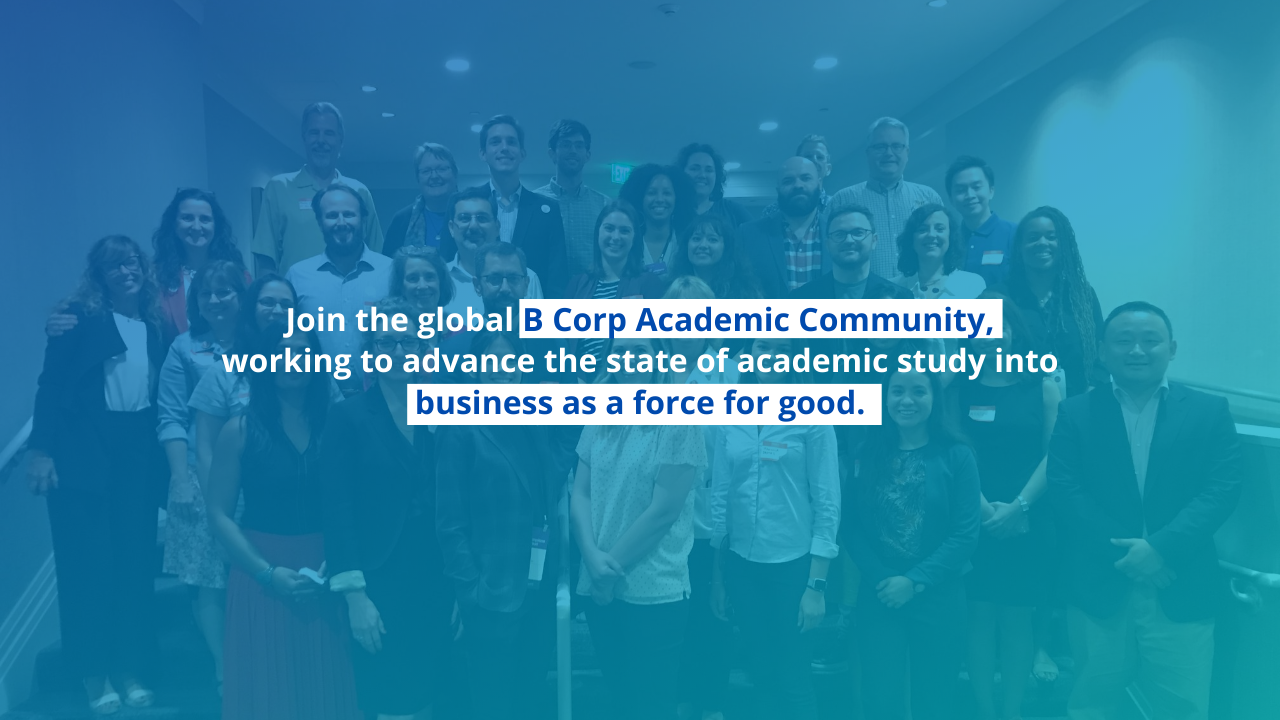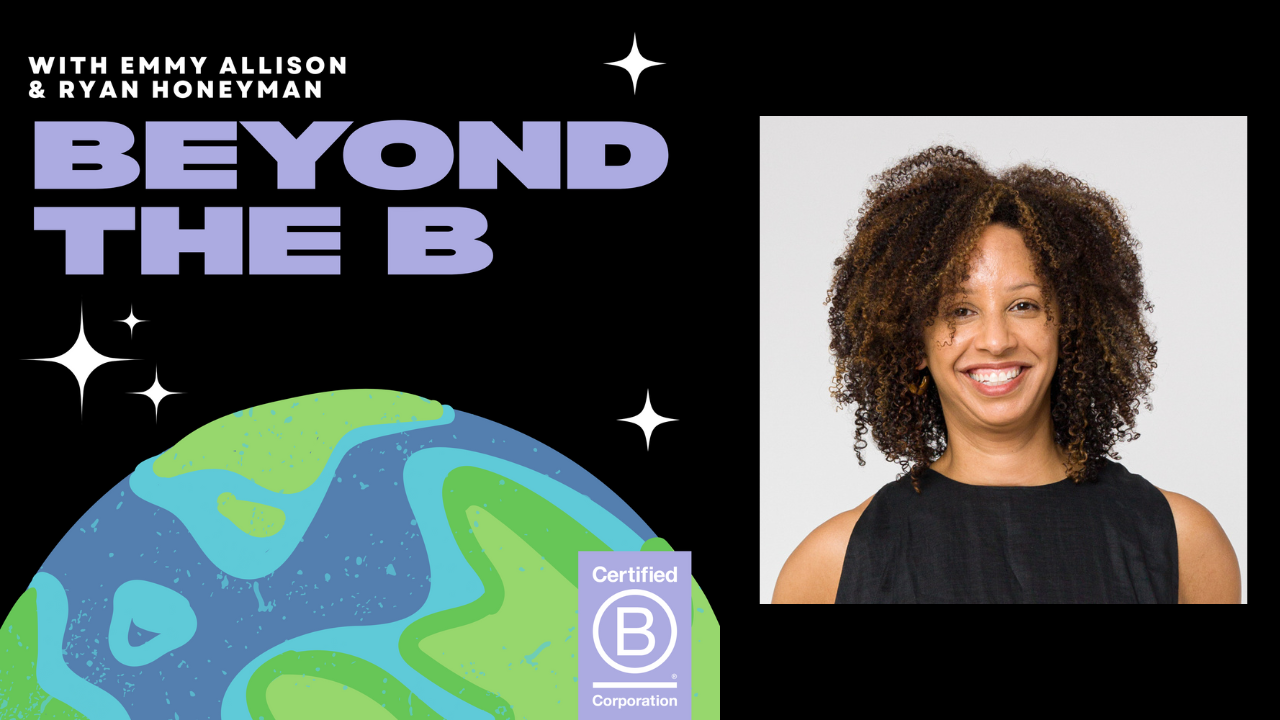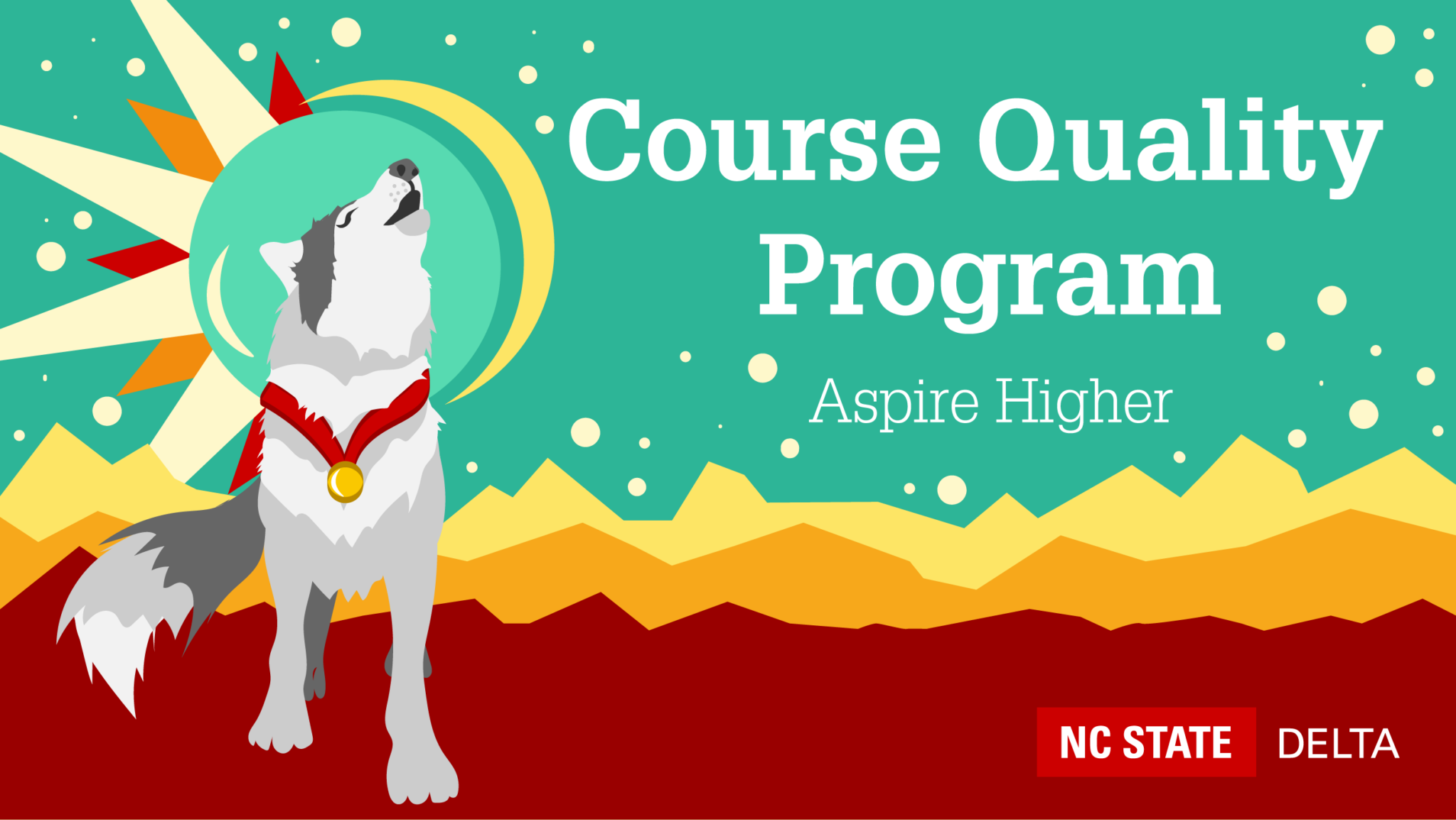B Academics Network Hosts the 2020 Global B Academics Paper Development Workshop

By Nikki Hensley, BSC Associate & Ph.D. Candidate, College of Natural Resources, NC State University
The global B Academics network recently held its 2020 Global B Academics Paper Development Workshop: Nuts and Bolts of Research on B Corps: Empirical Methods and Research Design. B Academics is 501(c)3 nonprofit organization that brings together over 1,900 academics and supporters from 612 institutions and 52 countries with a vision to “advance the state of academic study into business as a force for good.” The network is led by their president, Jessica Yinka Thomas who is the Director of the Business Sustainability Collaborative and a faculty member in the Poole College of Management at NC State, who kicked off the workshop. The event welcomed over 120 participants representing 19 different countries, bringing a wide range of perspectives to the conversation.
Sessions
Keynote by B Lab
The workshop keynote speaker was Ben Anderson, who is Co-CEO of B Lab US and Canada. Ben opened his talk with inspiring words of how the community has been affected by COVID and how the pandemic reinforces the need to be globally interdependent and rebuild together. The global governance structure is at the core of the community and demonstrates that through the power of collective action, B Corps can make a big impact. For example, at the recent UN Climate Conference, over 500 B Corps pledged to become net zero by 2030. While the overarching global vision is of an inclusive, equitable and regenerative economic system for all people and the planet, Ben stated the importance of “recognizing that we will have different strategies in our markets based on the market need.” One size does not fit all and it is valuable to embrace the unique needs of each community to make the greatest positive impact. Because of this, the B Lab Inc. Board has been restructured to reflect the varying needs of each community.
Ben shared that his team has developed their own Theory of Change which has opened up the conversation as to how the Theory of Change should look at the global level. Within his plan, credible business leaders and a stakeholder governance framework are the two core assets. He also shared that change must come from a shared JEDI (Justice, Equity, Diversity and Inclusion) Literacy which they see as a foundational element. This is adding to existing B Lab practices such as the Inclusive Economy Challenge and hiring a director of EDI as Ben acknowledges that the organization had not “publicly stepped up in being anti-racist” and will “lean into” this stance moving forward. As part of that work, B Lab has taken an Anti-racism stance as follows:
“As an organization, we stand against anti-Black racism and all forms of oppression including transphobia, classism, sexism, and xenophobia. We commit to a focused and sustained action to dismantle racist systems, policies, practices, and ideologies within ourselves and our networks. As we continue to learn about injustice, we embrace radical reorientation of our consciousness and will listen to the voices of Black, Brown, Indigenous and marginalized peoples to catalyze equitable outcomes for all.”
B Corps are not immune to the impacts of COVID, 46% faced negative financial impacts in the first month, but 9% saw an increase in service or demand. However, 80% expect lasting impacts and many are facing supply chain challenges. Despite facing their own challenges, over half of B Corps surveyed expressed interest in helping other businesses that are in need. People are looking for more impact and purpose in their businesses and Ben sees this as an opportunity to “amplify [B Corps] because it’s what the world is wanting.” There are many challenges businesses are facing from COVID, but the B community is resilient and is focused on the long-term while supporting their communities as best they can in the short-term.
B Corp Standards and Assessment
Ben Osusky, Director of Standards at B Lab, followed suit by sharing the exciting updates in Version 6 of B Impact Assessment (BIA) including the addition of the SDG action manager that brings together the UN Sustainable Development Goals and the BIA so companies can create their own initiatives and fill the gaps in the BIA. Version 6 has been available for about two years and B Lab has been reviewing its progress since there were some significant changes from its last version including ways to “create meaningful action around topics like justice, equity, diversity and inclusion.” As a living assessment, some content changes and as the world is quickly shifting, the assessment must follow, especially in terms of the COVID crisis, racial justice uprising, and the climate emergency. The SDG Action manager has only been around for a few months but has already been used by thousands to self-assess and benchmark their performance.
Another issue being addressed in the BIA is its audience as it has typically been used by small and mid-sized companies, there has been a growing interest for multinational organizations that may require a different approach. Part of this approach was developing baseline requirements that these large companies must meet in addition to the BIA because there is “a minimum set of practices that all multinationals must have in place in order to appropriately consider themselves leaders in this movement and therefore deserving of B Corp Certification.” There has also been progress on different standards based on industry since some industries are naturally controversial in sustainability.
Despite the progress the BIA and B Lab has made since its founding, Dan shares that they are taking a step back to adopt the standards to a changing world and question “what does leadership in this space actually look like?” This movement has already been driven to accelerate impact and it is important to make sure that is still happening on all levels and reflects what is happening globally.
Research Panel Discussion
Participants returned for a panel discussion with academics of different institutions to address research and writing challenges such as funding and data collection. The panelists included Kendall Park of Vanderbilt University, Michael Conger of Miami University, Suntae Kim of Boston College and Nancy Kurland of Franklin & Marshall College with moderator Joel Gehman of the University of Alberta and Vice President for B Academics.
Michael got started early in the movement in Colorado and did his dissertation on B Corps and has done state by state work on Benefit Corporations. He is now researching the role of collective action on civic wealth creation. Nancy has taken a different approach and has done a deeper dive into a single firm, EA Engineering Science and Technology. She mainly focused on their journey to becoming a Benefit Corporation specifically as an employee-owned business. Nancy ultimately found that there was too little guidance for what Benefit Corporation should do once incorporated and the onus is on itself. Suntae used a quantitative approach to look at the movement on a more macro level compared to traditional companies with a guiding question of “How the behaviors of traditional corporations create a fertile ground for B Corps to grow?” They discovered two categories of companies that seek B Corp certifications, oppositional and authenticity. Oppositional B Corps aim to “transform the status quo and revolutionize capitalism” while authenticity B Corps became B Corps because they wanted to solidify their status as a social enterprise. Kendall also completed her dissertation on B Corps after looking at conscious consumerism and reforming capitalism. She interviewed over 70 founders and leaders from B Corps and Benefit Corporations to collect her data.
Several noted there is a high demand for quantitative data in this field while qualitative seems to be more common. The conversation led to the conclusion that many members of the B Economy are looking for the same data which has no central storage. Many researchers have to use many different channels, public and private to collect their data and create a meaningful dataset. The lack of a central database creates extra work and hinders more meaningful work that could be completed with this spare time. These conversations lead the path for future researchers to make data more useful.
Breakout: Social Impact Stories
Participants of the workshop had the opportunity to share their thoughts and experiences in small breakout groups. I participated in the session with Kevin Christopher’s of Rockridge Venture Law on the topic of Creating a sustainable business in an on-demand, make-it-cheap e-commerce culture. We discussed how COVID could change the landscape of e-commerce and what strategies are most useful to contrast major e-commerce retailers. For example, are trustmarks such as B Corp or 1% for the Planet an important component to building initial trust?
Showcase Paper Presentations
Out of 39 research ideas and abstract submissions from around the world, four were selected to present their work in the Showcase Paper Presentations. Most of the papers were in the field of management, about two-thirds, while the rest were from a mix of other disciplines. Of the four to be featured, two were quantitative and two were quantitative showing how both have an important place in research on B Corps. The selected applicants were James Bort who is Assistant Professor at the University of Missouri-Columbia, Eugenia Rosca who is Assistant Professor in Supply Chain Management at Tilburg University, Sukhbir Sandhu who is a Senior Lecturer at the University of South Australia and Youthika Chauhan who is a Researcher at the University of North Carolina.
James’ paper is titled Organizational Virtue Signaling & Behavior Congruence: The Employee Perspective and got interested in this research after learning Kickstarter employees felt the need to unionize despite Kickstarter being chartered as a B Corp. B Corps are often good for their employees over the long term and he wanted to know how job satisfaction is influenced by organizational context. Eugenia presented co-author with Kelsey Taylor on their paper titled Social Value Creation through Supply Chains: The Case of B-Corps. Their research is focused on the upstream approach and how to create value by altering the supply chain with a goal to “explore whether you can link certain supply chain design aspects to specific impact areas.” They found that B Corps are excellent at engaging with the local community and serving marginalized communities, engaging with their suppliers and having a wider network of partners. Sukhbir then shared her research titled Environmental Sustainability and Gender Diversity: Does One Good Thing Lead to Another? They found that there are many secondary linkages between environmental sustainability and gender diversity and that is deepened over time within an organization but that becoming a B Corp often creates “positive coupling dynamics.” To close out the paper presentations, Youthika shared her research on Strategic Advantages through Social Responsiveness: The Case of Certified B-Corps. She aims to answer “How does certification play a role in the establishment of a category of firms internally and externally?” She found that as companies became certified B Corps, they underwent significant process and policy changes in addition to perception changes such as the fact that social and financial missions can be complementary to each other.
These incredible papers are just a handful of the many that have research on B Corps and the B movement. This research coming out of academic institutions is helping entrepreneurs and leaders make the best decisions for their businesses and improving communities in the process.
Youthika Chauhan at the University of North Carolina, received the Best Paper Award for this year’s B Academics Research Workshop, selected after receiving the most votes from a poll of the workshop participants.
Better Business: How the B Corp Movement is Remaking Capitalism
After hearing three incredible paper abstracts presented during a showcase paper presentation, Chris Marquis of Cornell University discussed the launch of his new book that will be a powerful force in the academic space for B Corps. Chris learned about B Corps early in the movement in 2009 when he was teaching and a student suggested studying the CSR of large companies with great social missions such as B Corps. Over the past few years, he has interviewed over 100 B Corps to develop his book.
His book, Better Business: How the B Corp Movement is Remaking Capitalism focuses on four key topics:
- What is the Purpose of Capitalism/What Does it Mean to be a Corporation?
- Making the Shift from Shareholder to Stakeholder Capitalism
- Managing Specific Stakeholders
- Changing the Future
There is a widespread idea that corporations exist for their shareholders which was a shift from their original purpose to provide people with lifelong employment and community. There has recently been many leaders speaking out to move corporate responsibility to all stakeholders and putting more resources into social impact. beyond this question arose as to how companies can be accountable for the stakeholders where the B Corp model can be useful to offer solutions while meeting the requirements of modern business systems and laws. Chris shares that the “two core innovations the B Lab movement is putting forth are key to [stakeholder primacy].” Those innovations being the BIA and the Benefit Corporation status. To manage specific stakeholders, many tools have been developed by B Lab over the years such as GIIRS and B Analytics. Local clusters have also been important to improve stakeholder impact within different communities. To grow this movement, the BIA will be vital since “one of the things that’s most useful about the BIA is that it’s just actually good management,” and should be “used as a playbook to run a good company.” Large multinational corporations will also be important models for smaller companies to follow.
All of these topics are at the foundation of B Corporation movement and impact-driven businesses as a whole. B Corporations are the businesses that hold themselves accountable to benefit all stakeholders while setting goals that have a positive impact on business and this should be a model for all companies in the future.
The road forward
The virtual platform enabled this year’s workshop to be attended by people from over 20 countries which further emphasizes the global community of B Lab and B Academics. This global movement has come far since its inception but has a long path forward that will create a great impact in the academic space. The uplifting network of B Academics is filled with problem-solving champions who bring light to research and teaching that will help shape future leaders. Upon closing, I reflected on this passionate community that is helping me become a leader and change business as we know it.
- Categories:


